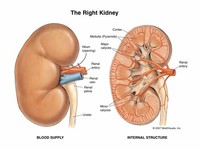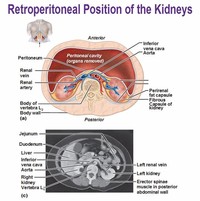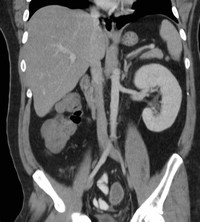Facts about Kidneys

The kidneys are "bean-shaped" organs, having a concave side facing inwards (medially).

The kidneys excrete a variety of waste products produced by metabolism, including the nitrogenous wastes: urea (from protein catabolism) and uric acid (from nucleic acid metabolism).

The medical field that studies the kidneys and diseases affecting them is called nephrology, from the Greek name for kidney; the adjective from Latin meaning "kidney-related" is renal.

The kidneys are retroperitoneal, which means they lie behind the peritoneum, the lining of the abdominal cavity.

Congenital absence of one or both kidneys, known as unilateral or bilateral renal agenesis, respectively, can occur.

Medical terms related to the kidneys involve the prefixes renal- and nephro-.

The kidneys regulate the pH, by eliminating H ions concentration called augmentation mineral ion concentration, and water composition of the blood.

The kidneys secrete a variety of hormones, including erythropoietin and urodilatin, as well as vitamin D.

Part of the urinary system, the kidneys filter and excrete wastes from the blood, principally nitrogenous wastes originating from protein and amino acid metabolism.

The kidneys demonstrate the remarkable harmony of the vertebrate body, working together with the circulatory, digestive, nervous, and endocrine systems to allow an integrated, properly functioning body.

